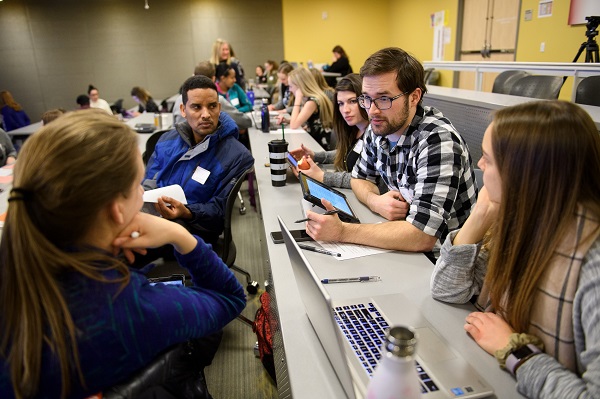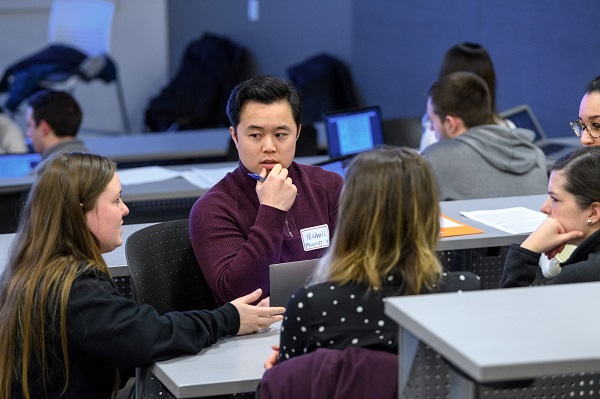
Any health care provider in Washington is likely to encounter patients who use opioids, either legally prescribed or illegally obtained.
Caring for those patients takes teamwork and communication – skills that now are being taught to students in the medicine, pharmacy and nursing programs at WSU Health Sciences.
The two-hour class was developed by faculty at WSU using funding from the Washington Department of Health. About 350 students from WSU and Eastern Washington University took the class in January and February.
Soon it will be freely available online to any university wanting to offer the curriculum to its students. A follow-up grant also will adapt the material for use by rural health clinics.
“We know that a lot of times when patients run into problems with opioids its because there’s poor communication on the health care team,” said Barbara Richardson, PhD, RN, an associate clinical professor in WSU’s Elson S. Floyd College of Medicine. “People can fall through the cracks; our goal is to build a system where the cracks don’t exist.”
The curriculum was designed by Richardson, whose specialty is interprofessional communication; Marian Wilson, PhD, RN, an assistant professor in the College of Nursing who has done extensive research into opioid use and misuse; Brenda Bray, MPH, BPharm, an assessment specialist in the College of Medicine; and Connie Remsberg, PhD, PharmD, of the WSU College of Pharmacy and Pharmaceutical Sciences, where she leads efforts in advancement of teaching and learning excellence.
Lessons start with language
Teams of at least four students – from nursing, pharmacy, medicine and either social work or chemical dependency – begin by talking about appropriate language. Richardson said patients who use opioids sometimes don’t seek care because they feel stigmatized.
“If you ask someone for a urine sample, you don’t say their urine’s ‘dirty,’” she said. “You wouldn’t say that about any other patients. Instead, you say their urine tested positive for opioids.”
Next they talk about roles and responsibilities. If a nurse screens a patient and suspects possible opioid use disorder, the nurse needs to convey that information to other providers. If a patient’s spouse confesses concern to a pharmacist, the pharmacist likewise needs to pass along that information to the appropriate team members.
Then the student teams tackle two fictitious, though typical, patient cases. One is a middle-aged man who has chronic back pain from a car wreck, the other is a pregnant female veteran who has chronic pain and PTSD related to her military service. The scenarios can be staged by actors, or the curriculum includes videos of the two sequences for students to watch.
The teams confer about how to help these patients, and how to talk to patients about their opioid use.
Wilson, of the College of Nursing, said having all of the professions work together results in a “holistic plan to address this person’s pain. The problem needs this input because of the multidimensional aspect of chronic pain and opioid use disorder.”
New grant will offer training to rural clinics
The Washington Department of Health asked Richardson to create the curriculum because of her success with a federal grant to teach students how to talk to patients about drinking and drug use.
All of the Elson S. Floyd College of Medicine’s second-year medical students took part this year, as did all senior nursing students and third-year pharmacy students. Students studying social work and chemical dependency at Eastern Washington University also participated.
The curriculum includes pre-reading, a guide for faculty facilitators and other materials. The WSU team will train facilitators in Yakima and Seattle and devise a way to make the curriculum widely available.
They recently received additional funding from the Northwest Center for Public Health Practice that will allow them to adapt the curriculum for use in rural health care clinics.
“Some of the biggest problems in opioid use disorder are showing up in our rural communities, and rural communities are much less likely to have pain specialists,” Wilson said. “But WSU students are working in rural communities. If we can give them some of these tools, and have that knowledge reinforced by rural clinicians, we can change the trajectory.”
–Addy Hatch
Project help sought
The WSU project team is seeking a graduate student to help with the project who has an interest in facilitating interprofessional experiences and/or about opioid use and pain care in rural clinics. The position will include about 8-10 paid hours for four to five weeks. Students who want independent study credits can work on the project for a longer time frame. For more information contact Marian Wilson at (509) 324-7443 or marian.wilson@wsu.edu.

